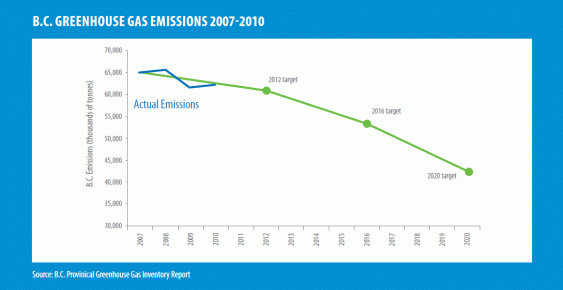In 2008, British Columbia rolled out the first large-scale carbon tax in North America. It is a somewhat unique tax because it is “revenue-neutral,” meaning that the government returns the revenue to taxpayers in the form of reductions in personal and corporate income taxes, along with a few other targeted tax reductions. In short, BC aims to reduce emissions by taxing harmful pollution while at the same time boosting economic growth by reducing tax rates.
Sightline has long argued that BC’s carbon tax is a good model, and now two recent independent reports chart the policy’s progress. One, British Columbia’s Carbon Tax Shift: The First Four Years, is by the University of Ottawa’s Sustainable Prosperity research network. The other, Making Progress on B.C.’s Climate Action Plan, is by the BC Ministry of Environment.
Together the reports show that BC’s carbon tax has been accompanied by the strongest GDP growth in Canada as well as modest reductions in greenhouse gas emissions. New data in the reports suggest that BC is decoupling its economic growth from fossil fuel use and carbon emissions—an encouraging sign for sustainable growth.
Decreasing Emissions
The past four years have been a success for emissions reductions in BC. The Sustainable Prosperity report finds that emissions in 2010—the latest year for which data are available—had dropped by 4.5 percent from 2007 levels. And in fact, according to the Ministry of Environment, emissions covered by the carbon tax decreased by 9.9 percent on a per capita basis between 2008 and 2010.
While neither of the reports could demonstrate that the carbon tax was the sole, or even the primary, cause of the reductions in carbon emissions, there are some compelling indications that the carbon tax has been effective. For example, emissions in BC on a per capita basis decreased 5.3 percent more than the rest of Canada where no carbon tax exists.
Other indicators that correlate with greenhouse gas emissions, such as fossil fuel use, also show that BC’s carbon tax may be responsible for some of the emissions reductions. Between 2008 and 2011, per capita petroleum fuel use in BC declined 16.4 percent more than in the rest of Canada over the same time period. Also, the annual per capita petroleum fuel use in BC decreased twice as quickly after the carbon tax was implemented compared to the annual decrease during the seven years before. (Of course this period also roughly corresponded with an era of higher world oil prices.) Overall, BC saw its per capita consumption decreasing 5.2 percent per year after the carbon tax was introduced, while the rest of Canada saw increasing per capita consumption.
The emissions reductions have played out differently across sectors covered by the tax. While per capita sales of refined petroleum products declined 5.2 percent since 2008, motor gasoline sales declined by only 4 percent. The difference suggests that the tax is not affecting driving as much as it is affecting other uses of oil.
Still, BC’s emissions reductions are, so far, on track to meet the province’s goals set for 2012, 2016, and 2020. To stay on course the province will need to realize steady annual emissions reductions.
GDP Growth
Since BC introduced a carbon tax it has seen better GDP performance than the rest of Canada with real GDP in the province growing 4.4 percent. While GDP per capita actually declined slightly—by 0.15 percent—it did so at just half the rate of decline that the rest of Canada experienced, suggesting that the decline was due to the global economic downturn rather than the tax. For comparison, in the United States, GDP per capita declined 1.2 percent during the same time period.
In short, in the era of the carbon tax, BC’s GDP performance outpaced both the United States and the rest of Canada.
Looking Forward
The two reports confirm our belief that BC’s carbon tax is a worthy model for others to follow. But we should acknowledge that the tax is not perfect. It’s been criticized for its potential to erode economic equity in the province. Several NGOs have pointed out that the tax does not apply to large carbon-intensive sectors of the economy, such as natural gas flaring, coal exports, and emissions from logging. We’ll take up these legitimate concerns in a subsequent blog post, but none of these critiques change the results we’ve reported here: the carbon tax appears to be effective at reducing the emissions it applies to and it does not appear to harm economic growth.
So far, BC’s experience lines up perfectly with the theory behind carbon tax shifting. BC has seen moderate decreases in the emissions the carbon tax targets, as well as stronger economic growth than the rest of the Canada. The province is living proof that emissions reductions and GDP growth can go hand-in-hand.

Comments are closed.